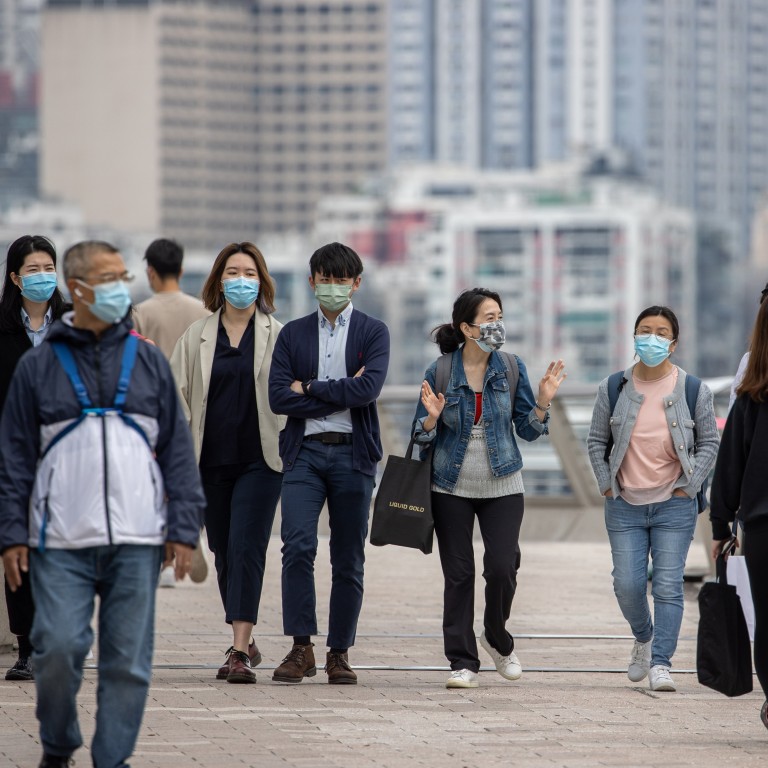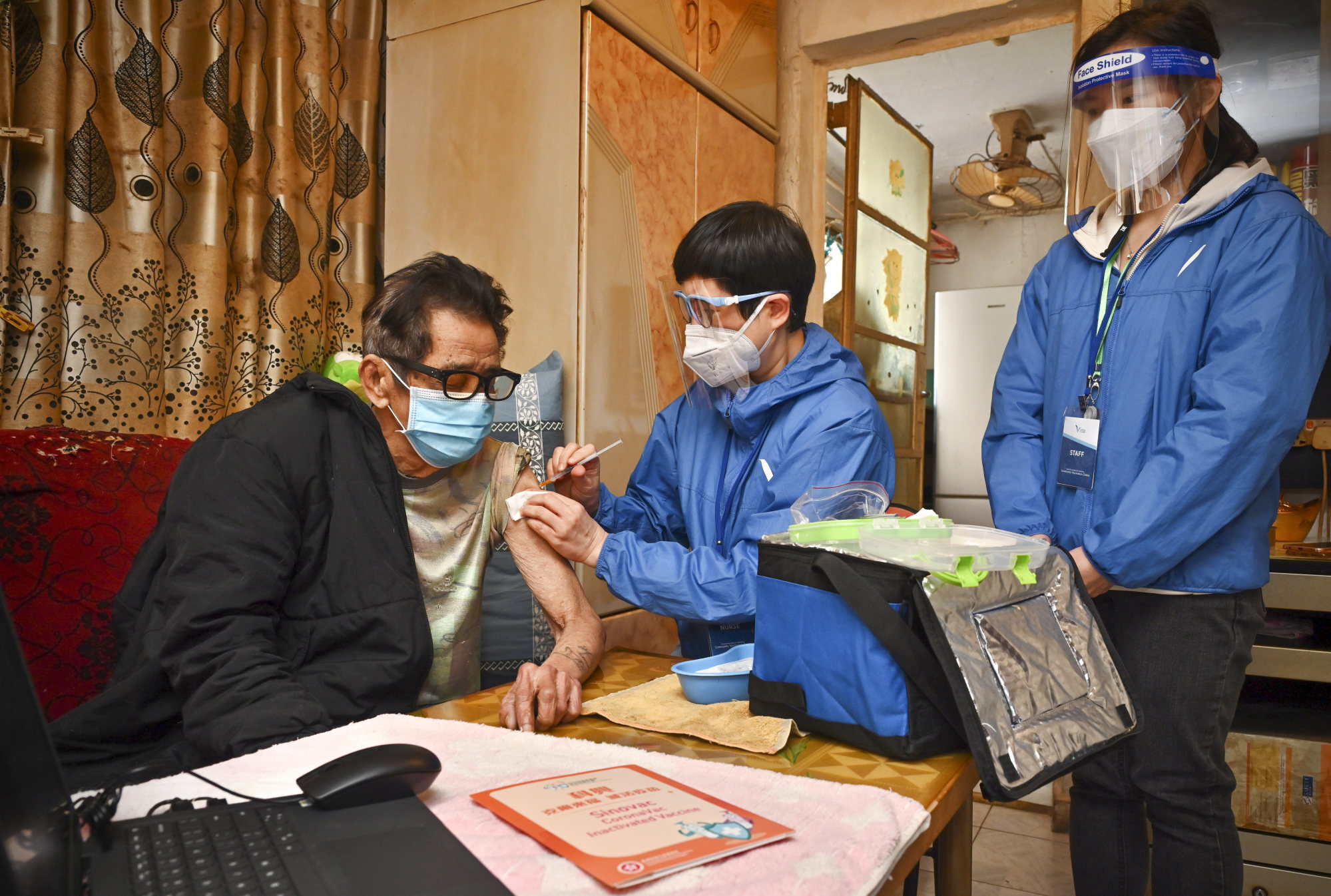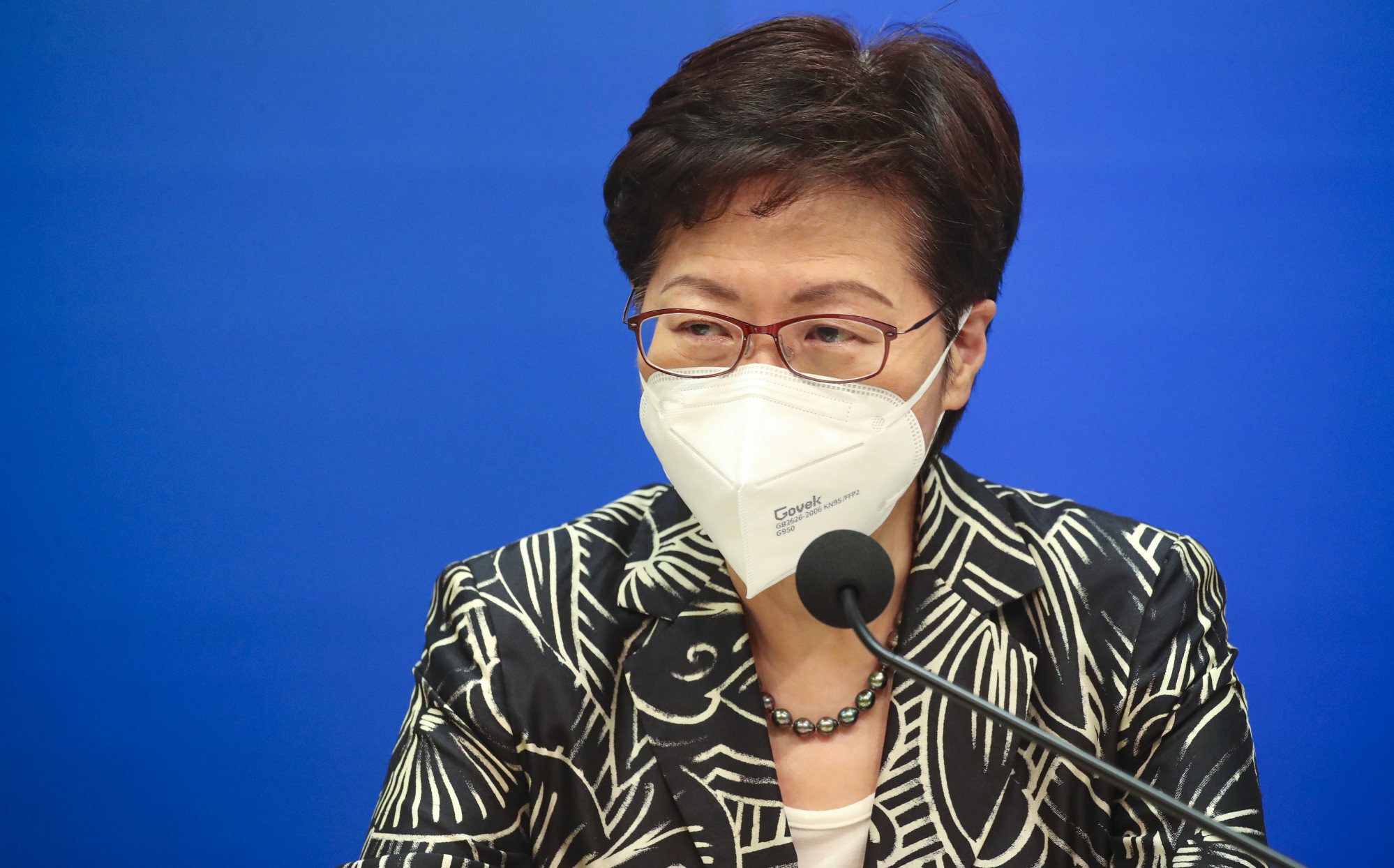
Coronavirus: Hong Kong turns corner in fifth wave with 946 new infections, daily caseload below 4 digits for first time in more than 2 months
- Home vaccination scheme for elderly and disabled set to launch, with applications to open on Tuesday
- City leader Carrie Lam will not hold regular Covid-19 briefing on Saturday as case numbers dip below 1,000
Hong Kong has turned the corner in its battle against a crippling fifth wave of Covid-19, with its daily infection total falling below 1,000 for the first time in more than two months and the city’s leader deciding to stop holding the regular pandemic briefings that she began at the height of the health crisis.
Health authorities confirmed 946 new infections on Friday, 11 of which were imported and the rest locally transmitted. The total marked the first time it dipped below four digits since February 10, when 986 infections were confirmed.
Authorities also reported 67 Covid-19-linked deaths, including 31 backlogged cases. The city’s overall case tally since the pandemic began stood at 1,196,284, with 9,069 fatalities.
Chief Executive Carrie Lam Cheng Yuet-ngor would stop holding her regular Covid-19 briefings from Saturday, her office announced on Friday afternoon. She had previously said she would stop giving regular updates to the public if daily caseloads dropped into the hundreds, as that meant the city’s fifth wave of infections had stabilised.
Lam would continue to meet the press before the Executive Council meeting every Tuesday, starting from April 26.
Asked if the Centre for Health Protection considered Friday’s three-digit caseload to be high, Dr Chuang Shuk-kwan said the assessment depended on what the figure was compared with.
“If we compare the situation with the peak in March, then of course the daily caseload is low. But about 1,000 cases per day is high compared to the numbers recorded during the first to fourth waves,” she said.
Government pandemic adviser Professor David Hui Shu-cheong said the drop in cases was expected as the daily figures had been declining over the past few weeks.
“Now we have the Easter holiday and the coming relaxation of social-distancing rules, so we need to continue observing the trend for the next seven to 10 days to see if there is a rebound, he said.
“But the risk is not very high because estimates show that 4 million people have already been infected and have protective immunity after recovery. More than 90 per cent of the population have received one dose of vaccine, and over 80 per cent have had two, so they have protection. However, we still need to monitor the situation.”

Meanwhile, authorities will start accepting applications for a home vaccination programme from Tuesday, aimed at covering all 18 districts by the end of May to inoculate seniors and residents with disabilities.
At a daily press conference on Friday, Secretary for the Civil Service Patrick Nip Tak-kuen, who is in charge of the government’s vaccination programme, said welfare and health authorities would also approach the elderly proactively.
He said the government’s home vaccination programme would accept applications from April 19. Elderly Hongkongers aged 70 or above and disabled residents can sign up via a designated online platform and hotline, and officers will start visits from April 26.
“The programme will last for eight weeks. Each week we will visit four to five [of Hong Kong’s 18 districts], and finish one cycle in four weeks,” Nip said. “After 28 days, we will visit these [applicants] again and give them the second dose of Sinovac vaccines.”
Nip added that as the BioNTech vaccine would require a more complicated dilution process, the government would not provide the brand at this stage.
He said to encourage applications, the Social Welfare Department would send promotional leaflets about the service to more than 200,000 elderly social security assistance recipients who are not yet vaccinated, and the service’s call centre would also contact them to provide help with registration.
Covid-19 crisis at Hong Kong’s care homes: a disaster waiting to happen
Nurses from the Department of Health’s elderly healthcare centres will also contact their 28,200 unvaccinated seniors about the new programme, while text messages about the fourth dose will also be sent to those who have had three doses.
Unvaccinated senior users of government clinics will also receive reminders from the Hospital Authority.
Authorities will continue to collect information on homebound elderly and disabled residents in building lockdown operations in April and May.
As of April 14, 50 people from 13 buildings had been inoculated under the pilot home vaccination scheme, comprising 42 elderly residents aged between 70 and 98, four people who were homebound and four family members of applicants, according to Nip.
The department had also collected 100 new applications and would take over about 9,000 cases from the Hong Kong Council of Social Service’s pilot programme.
Nip added that although the citywide home vaccination programme was “a very time- and labour-intensive operation”, the need to inoculate vulnerable individuals with mobility issues still existed.
First-dose Covid vaccination rate among Hong Kong’s elderly plunges 85 per cent
He also said authorities would launch the third phase of outreach vaccination programmes to further boost the inoculation rate of residents in care homes by May 10, while the time period between recovery and the next Sinovac dose for care home residents had been shortened to 28 days.
As of Thursday, 70 per cent of care home residents have received one jab, while 42 per cent had been double vaccinated. Among Hongkongers aged 12 or above, 92.6 per cent had received at least one shot, with the figure at 86.4 per cent for those with two jabs.
Only 63.6 per cent of children aged three to 11 had received one shot. For elderly residents aged 70 or above, the first-dose vaccination rate was 73.5 per cent.
Hong Kong last week rolled out fourth vaccine doses for the elderly and those with compromised immune systems, with at-home outreach services provided by authorities and NGOs for such vulnerable groups.

Lam on Thursday night said on Facebook that she, accompanied by Secretary for Food and Health Sophia Chan Siu-chee, had visited the Central Library in Causeway Bay for her fourth Sinovac dose.
Fourth vaccine doses are available to the elderly aged 60 or above who have received their last shot at least three months ago.
“We must make all effort in protecting the elderly and children … and minimise the risk of them being infected, hospitalised or suffering from serious side effects,” Lam wrote.
Asked on Friday at the same press conference if the city was still adopting a “zero-Covid approach”, Lam said adequate isolation facilities allowed the government to deal with a higher number of infections.
“Today’s high level [of 1,000 cases] is different from the high level of [150 cases] two years ago,” she said. “With the new capacities, we should not deal with the pandemic with an old attitude in which Hong Kong may need to pay heavy economic costs.”
Most ignore vaccine pass rules in Hong Kong, asking: why bother?
Hong Kong will start easing social-distancing curbs from April 21, including an extension of dine-in hours for restaurants and the reopening of premises such as gyms, sports venues and cinemas.
But businesses and customers will still be subject to tough vaccination and testing rules for Covid-19.
On the education front, new guidelines issued on Thursday night also allow fully vaccinated students to join large-scale activities held by schools.
“If schools have to organise mass events such as parents’ day, open day, campus visits, sports day or swimming galas … we only allow students having received two doses of vaccines [with at least 14 days from the second jab] to join,” the guidelines from the Education Bureau read.
Fully vaccinated students can join sports and music programmes after school, practise wind instruments or play contact sports such as basketball and football without wearing masks.

But the guidance stated that if students without masks had meals or joined an activity with a confirmed coronavirus case, they should refrain from mask-off activities for a week and undergo RAT for seven consecutive days, including on non-school dates.
Under the new policy requiring all students to undergo rapid testing on every school day, parents are also urged in the updated guidelines to sign record sheets stating their children’s temperature and RAT results.
Recovered staff or students are not required to undergo the RAT requirements within three months from the date of the end of their infection.
Families receiving Comprehensive Social Security Assistance or those under the School Textbook Assistance Scheme will be given free test kits. Each school will also receive an extra 600 kits for pupils in need but not under the two schemes.
Additional reporting by William Yiu



